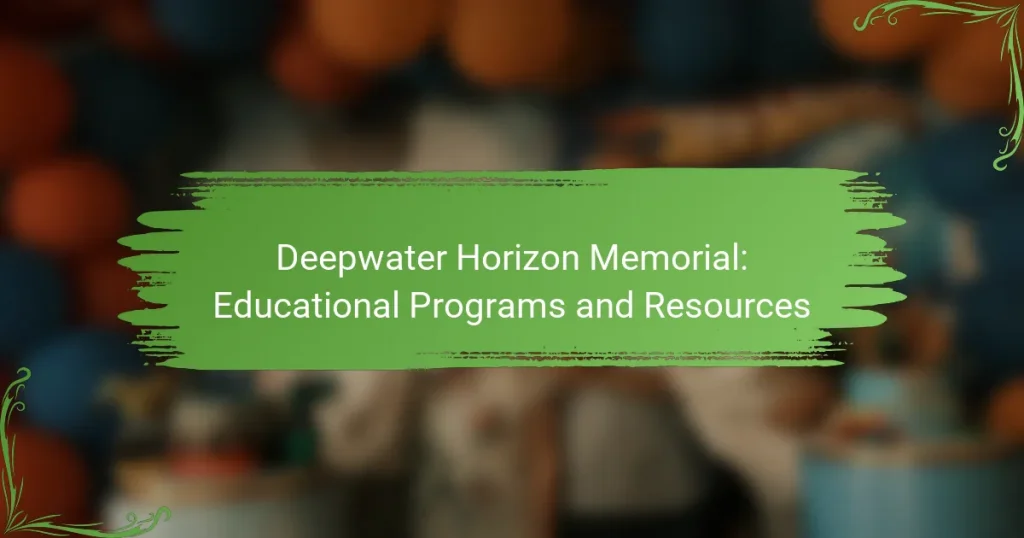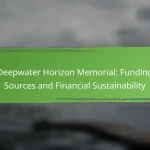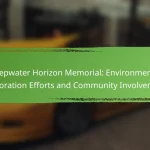The Deepwater Horizon Memorial is a dedicated tribute to the 11 workers who lost their lives in the 2010 Deepwater Horizon oil spill disaster, located in New Orleans, Louisiana. This memorial not only honors the victims but also serves as a platform for environmental education, raising awareness about the ecological impacts of oil spills on marine ecosystems. It offers various educational programs, interactive exhibits, and resources focused on offshore drilling safety and environmental stewardship. Future initiatives include expanding outreach efforts, developing digital resources, and organizing workshops to foster community engagement and promote discussions about energy practices and conservation.
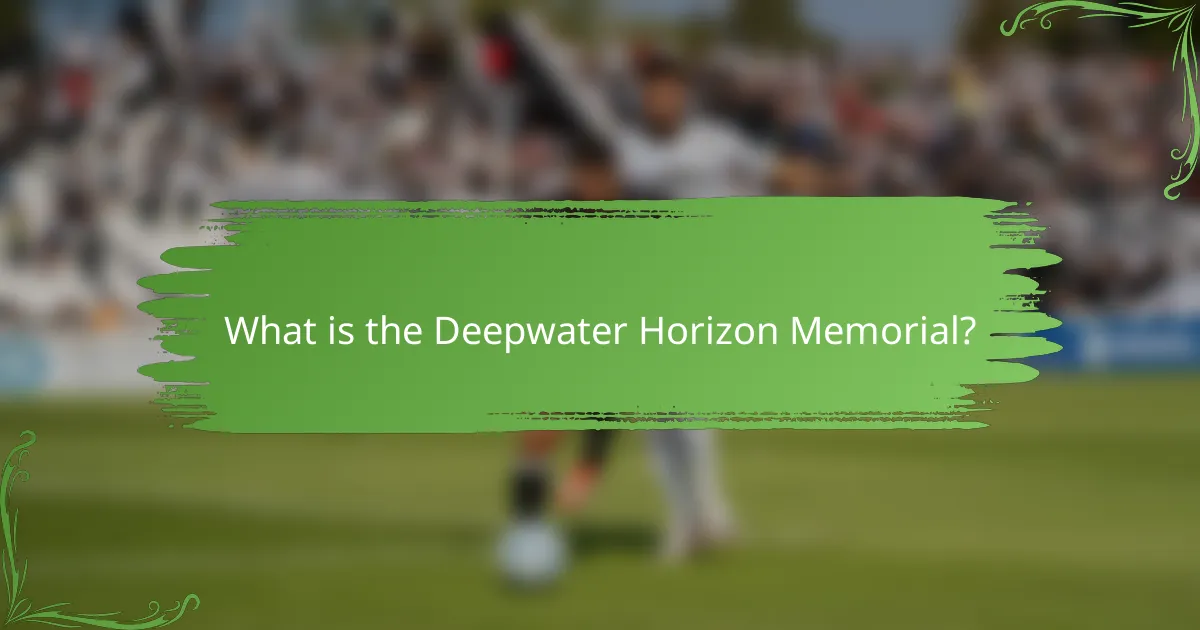
What is the Deepwater Horizon Memorial?
The Deepwater Horizon Memorial is a tribute dedicated to the victims of the 2010 Deepwater Horizon oil spill disaster. It honors the 11 workers who lost their lives in the explosion. The memorial is located in New Orleans, Louisiana. It serves as a reminder of the environmental impact of the spill. The site includes educational resources about offshore drilling safety. It aims to promote awareness of the importance of environmental protection. The memorial also engages the community in discussions about energy and safety practices. It stands as a symbol of resilience and remembrance.
Why was the Deepwater Horizon Memorial established?
The Deepwater Horizon Memorial was established to honor the 11 workers who lost their lives in the 2010 oil rig explosion. It serves as a tribute to their sacrifice and the impact of the disaster on families and communities. The memorial aims to raise awareness about offshore drilling safety and environmental protection. It also provides educational resources about the incident and its consequences. The site offers a space for reflection and remembrance for visitors. The establishment of the memorial underscores the importance of safety regulations in the oil industry. It is a reminder of the ongoing need for vigilance in preventing similar tragedies.
What events led to the creation of the memorial?
The Deepwater Horizon Memorial was created in response to the catastrophic oil spill in 2010. This disaster resulted from an explosion on the Deepwater Horizon drilling rig. The explosion killed 11 workers and caused extensive environmental damage. The memorial aims to honor the victims and raise awareness about offshore drilling safety. It serves as a reminder of the risks associated with oil exploration. The event highlighted the need for improved safety regulations in the industry. Following the disaster, public outcry demanded accountability and memorialization of the incident. The memorial was established to educate future generations about the consequences of such tragedies.
Who are the key stakeholders involved in the memorial?
The key stakeholders involved in the Deepwater Horizon Memorial include local government agencies, environmental organizations, and community members. Local government agencies oversee the memorial’s development and maintenance. Environmental organizations advocate for the preservation of marine ecosystems affected by the disaster. Community members participate in memorial events and educational programs. These stakeholders collaborate to ensure the memorial serves its purpose of education and remembrance. Their involvement is crucial for fostering awareness about the impact of the Deepwater Horizon oil spill.
What educational programs are offered at the Deepwater Horizon Memorial?
The Deepwater Horizon Memorial offers educational programs focused on environmental awareness and marine safety. These programs include guided tours that explain the impact of the oil spill. Workshops are available to teach participants about marine ecosystems. Educational materials are provided to enhance learning experiences. The memorial also hosts public lectures featuring experts in environmental science. Community outreach initiatives aim to engage local schools in conservation efforts. These programs are designed to promote understanding of the importance of marine environments.
What topics are covered in the educational programs?
The educational programs cover topics related to the Deepwater Horizon oil spill. These topics include environmental impact, safety protocols, and response strategies. Programs also address oil spill prevention and recovery methods. Additionally, they explore the economic effects on local communities. The curriculum incorporates lessons on marine biology and ecosystem restoration. Workshops and lectures are designed to engage participants in hands-on learning. The educational initiatives aim to raise awareness about environmental stewardship. They provide historical context and promote discussions on energy sustainability.
Who is the target audience for these programs?
The target audience for the Deepwater Horizon Memorial educational programs includes students, educators, and the general public. These programs aim to educate participants about the environmental impact of the Deepwater Horizon oil spill. Students can gain insights into marine ecology and conservation efforts. Educators can use the resources to enhance curriculum related to environmental science. The general public is encouraged to learn about oil spill prevention and response strategies. These audiences are essential for fostering awareness and promoting responsible environmental stewardship.
How can individuals access resources related to the Deepwater Horizon Memorial?
Individuals can access resources related to the Deepwater Horizon Memorial through its official website. The website provides educational materials, event information, and contact details for inquiries. Additionally, local libraries and educational institutions may offer related resources. Visitors can also find brochures and informational displays at the memorial site. These resources aim to educate the public about the impact of the Deepwater Horizon oil spill. Accessing these materials helps raise awareness and understanding of environmental issues.
What types of resources are available for educators and students?
Educational resources available for educators and students include lesson plans, multimedia presentations, and interactive activities. These resources focus on the events and impacts of the Deepwater Horizon oil spill. They are designed to enhance understanding of environmental science and conservation. Additionally, educators can access online databases and archives related to the incident. Students can utilize visual aids and simulations to engage with the material. Workshops and training sessions may also be offered for educators. These resources aim to foster critical thinking and promote awareness of ecological issues.
How can these resources be utilized effectively?
The resources from the Deepwater Horizon Memorial can be utilized effectively by integrating them into educational programs. These programs should focus on environmental awareness and disaster response. Teachers can incorporate the resources into lesson plans to enhance student engagement. Workshops can be organized for community members to understand the impact of oil spills. Online resources can be shared widely to reach a broader audience. Collaborations with local organizations can strengthen community involvement. Evaluation of program effectiveness can guide future improvements. Research indicates that hands-on learning increases retention of information.
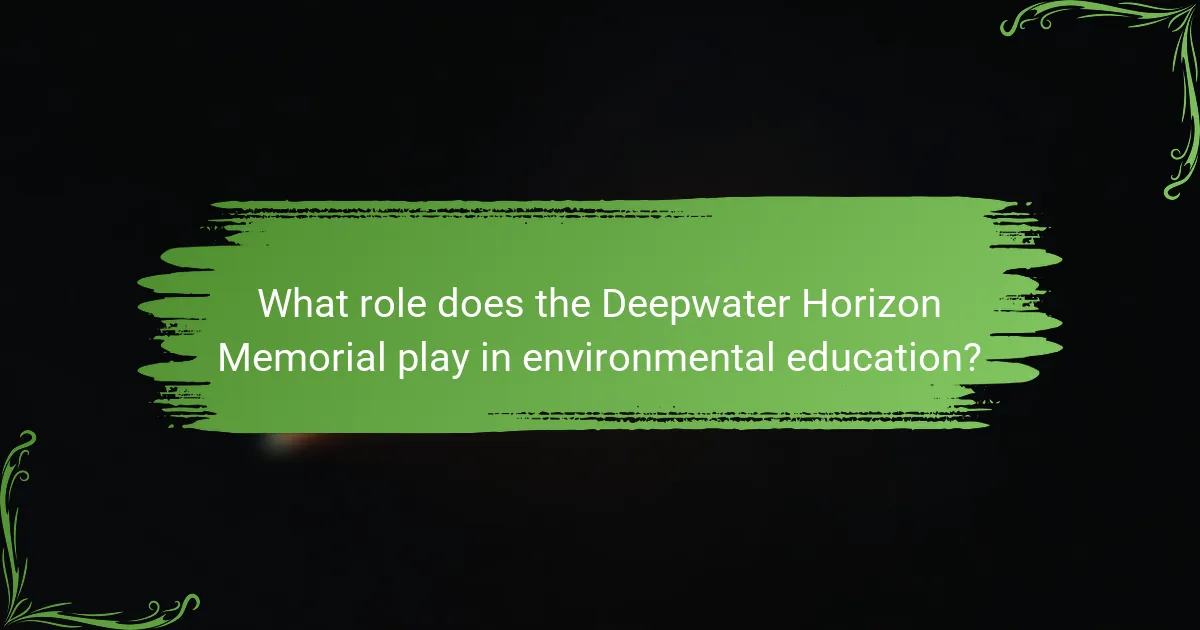
What role does the Deepwater Horizon Memorial play in environmental education?
The Deepwater Horizon Memorial serves as a significant tool for environmental education. It raises awareness about the impacts of oil spills on marine ecosystems. The memorial provides educational programs that focus on the ecological consequences of the disaster. Visitors can learn about the importance of conservation and restoration efforts. Interactive exhibits highlight the lessons learned from the incident. These programs aim to inform the public about sustainable practices. By fostering discussions on environmental responsibility, the memorial promotes proactive engagement. Overall, it plays a crucial role in educating future generations about environmental stewardship.
How does the memorial promote awareness about environmental issues?
The Deepwater Horizon Memorial promotes awareness about environmental issues through educational programs and resources. The memorial serves as a site for reflection on the environmental impact of the oil spill. It offers guided tours that educate visitors on the consequences of the disaster. Workshops and seminars at the memorial discuss oil spill prevention and response strategies. Informational displays highlight the ecological damage caused by the spill. The memorial collaborates with environmental organizations to enhance outreach efforts. Community events focus on sustainability and conservation practices. These initiatives engage the public and foster a deeper understanding of environmental stewardship.
What specific environmental topics are highlighted in the programs?
The specific environmental topics highlighted in the programs include oil spill impact, marine ecosystem recovery, and habitat restoration. These topics address the consequences of the Deepwater Horizon incident. Programs explore the effects of oil spills on wildlife and water quality. They also focus on the long-term recovery of affected marine environments. Additionally, habitat restoration efforts are discussed to rehabilitate damaged areas. Educational materials emphasize the importance of environmental stewardship. Participants learn about ongoing monitoring and research initiatives. This comprehensive approach ensures a thorough understanding of the environmental issues related to the disaster.
How does the memorial collaborate with local organizations for educational outreach?
The memorial collaborates with local organizations through joint educational programs and events. These partnerships enhance community engagement and awareness about the Deepwater Horizon disaster. Local schools, non-profits, and environmental groups participate in workshops and seminars. This collaboration promotes knowledge sharing and resource distribution. For instance, the memorial hosts field trips for students, offering hands-on learning experiences. Additionally, it provides educational materials developed in cooperation with local experts. These initiatives aim to foster a deeper understanding of environmental issues and safety practices. Through these efforts, the memorial strengthens its educational outreach and community connections.
What impact does the Deepwater Horizon Memorial have on the community?
The Deepwater Horizon Memorial positively impacts the community by serving as a site of remembrance and education. It honors the lives lost in the 2010 oil spill disaster. The memorial fosters community engagement through various educational programs. Local schools often visit to learn about environmental conservation and safety. These programs enhance awareness of the ongoing effects of oil spills. The memorial also promotes dialogue about disaster preparedness and response. Community events held at the site encourage collective healing and resilience. Overall, it strengthens community bonds while educating about environmental stewardship.
How do community members participate in memorial activities?
Community members participate in memorial activities through various forms of engagement. They attend memorial services to honor the victims of the Deepwater Horizon disaster. Participation often includes sharing personal stories and experiences related to the event. Community members may also volunteer for organizing events and activities. They contribute by donating resources or funds for memorial projects. Educational programs are another avenue for involvement, where members learn about the impact of the disaster. Additionally, community members may engage in discussions and workshops to promote awareness. These activities foster a sense of unity and remembrance among participants.
What feedback has been received from participants in the programs?
Participants in the programs have reported positive feedback regarding their experiences. Many have expressed appreciation for the informative content and engaging activities. Participants noted that the programs enhanced their understanding of the Deepwater Horizon incident. They also highlighted the value of interactive learning methods used in the sessions. Feedback indicated that participants felt more connected to the community and the memorial’s purpose. Additionally, some participants suggested improvements for future programs, such as more hands-on activities. Overall, the feedback reflects a strong interest in continuing educational initiatives related to the memorial.
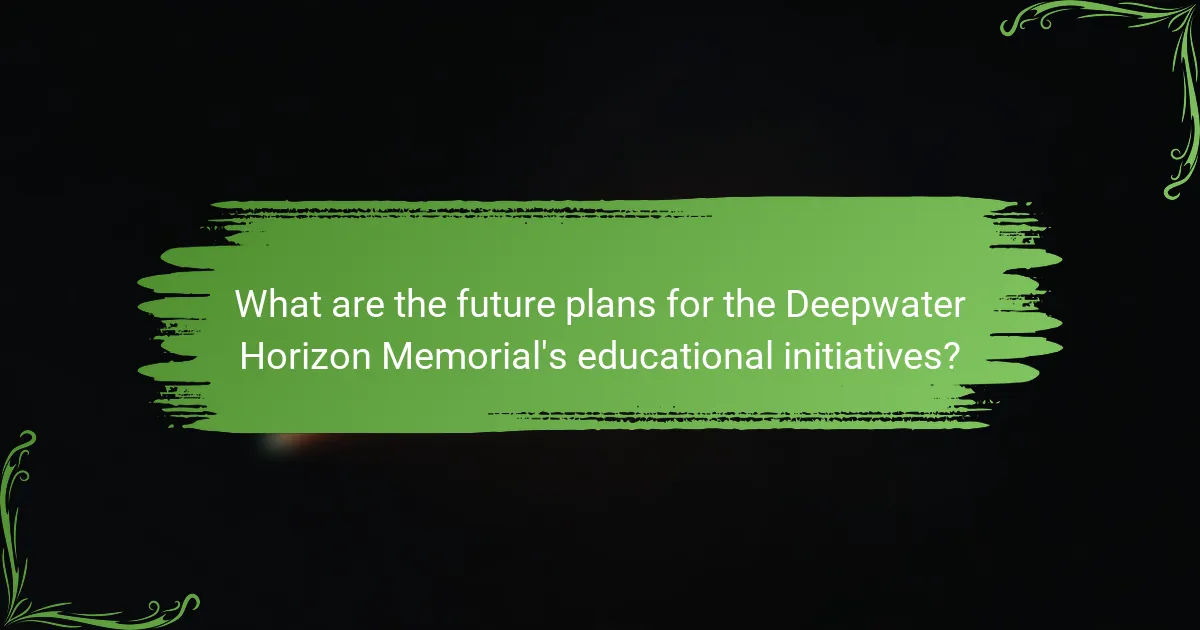
What are the future plans for the Deepwater Horizon Memorial’s educational initiatives?
The future plans for the Deepwater Horizon Memorial’s educational initiatives include expanding outreach programs. These programs aim to enhance public understanding of environmental impacts. The memorial plans to develop interactive exhibits and educational materials. Workshops and seminars will be organized to promote awareness of marine ecosystems. Collaborations with local schools will be prioritized for educational field trips. The goal is to engage the community in discussions about oil spills and their consequences. Future initiatives will also focus on digital resources to reach a broader audience. These plans demonstrate a commitment to education and environmental stewardship.
How will the memorial evolve its programs to meet changing needs?
The memorial will evolve its programs by incorporating community feedback and emerging educational trends. Regular assessments will identify gaps in current offerings. New partnerships with educational institutions will enhance program diversity. Technology integration will facilitate remote access to resources. Workshops will be updated to reflect contemporary environmental issues. Outreach initiatives will target underserved communities. These strategies will ensure relevance and engagement. The memorial aims to foster a deeper understanding of the Deepwater Horizon incident and its implications.
What new topics or resources are being considered for future development?
New topics and resources being considered for future development include marine ecosystem recovery and safety regulations in offshore drilling. These topics aim to enhance understanding of environmental impacts and industry practices. Educational programs will incorporate hands-on workshops and interactive exhibits. Resources will focus on digital content to reach wider audiences. Collaborations with universities and environmental organizations are planned. These initiatives will provide updated research and data on oil spill consequences. They will also promote community engagement and awareness.
What best practices can be implemented for engaging with the Deepwater Horizon Memorial?
Engaging with the Deepwater Horizon Memorial can be effectively achieved through several best practices. First, visitors should utilize guided tours to gain in-depth knowledge of the memorial’s significance. These tours often provide historical context and personal stories related to the event. Second, interactive educational programs can enhance visitor experience. Programs may include workshops and discussions that focus on environmental awareness and safety measures. Third, utilizing digital resources, such as mobile apps or websites, can provide additional information and enhance learning. These platforms may offer multimedia content, including videos and interviews with experts. Fourth, promoting community involvement through volunteer opportunities can foster a deeper connection to the memorial. Engaging local communities can create a sense of ownership and responsibility towards environmental conservation. Finally, hosting events such as remembrance ceremonies can honor the lives affected by the disaster. These practices collectively support a meaningful engagement with the Deepwater Horizon Memorial, emphasizing education and community involvement.
How can educators effectively integrate memorial resources into their curriculum?
Educators can effectively integrate memorial resources into their curriculum by aligning them with educational standards and objectives. This involves selecting relevant memorial resources that connect to the subjects being taught. For example, resources related to environmental science can enhance lessons on ecology and conservation.
Incorporating these resources can foster critical thinking and discussions about historical events and their impacts. Educators can use multimedia materials, such as documentaries or virtual tours, to engage students. Additionally, project-based learning can be employed, allowing students to explore memorial themes through research and presentations.
Collaboration with local memorial organizations can provide educators with additional support and materials. This partnership can enrich the learning experience and provide firsthand insights. Integrating memorial resources also promotes empathy and social awareness among students.
Research indicates that students benefit from experiential learning, which memorial resources can provide. Engaging with these resources allows students to connect emotionally with the content. Thus, integrating memorial resources into the curriculum enhances both educational outcomes and personal growth.
What strategies can be used to enhance community involvement in memorial events?
Engaging the community in memorial events can be enhanced through various strategies. First, organizing interactive workshops allows community members to participate actively. These workshops can focus on storytelling, art, or history related to the memorial event. Second, leveraging social media platforms helps spread awareness and encourages participation. For instance, creating event pages can facilitate discussions and share updates. Third, collaborating with local schools can integrate educational programs into the memorial events. Educational initiatives can foster a sense of ownership among students and their families. Fourth, inviting local leaders and influencers to participate can draw more attendees. Their involvement can motivate others to join and contribute. Fifth, providing volunteer opportunities allows community members to engage directly in planning and executing the events. This involvement can create a deeper connection to the memorial. Lastly, gathering feedback from past participants can inform future events. This feedback ensures that the community’s needs and preferences are considered. These strategies collectively foster a sense of community and enhance involvement in memorial events.
The Deepwater Horizon Memorial is a tribute located in New Orleans, Louisiana, dedicated to the 11 workers who lost their lives in the 2010 oil spill disaster. The memorial serves as an educational resource, promoting awareness of offshore drilling safety and environmental protection through various programs. Key stakeholders, including local government and environmental organizations, collaborate to enhance community engagement and provide educational materials. The memorial offers workshops, guided tours, and outreach initiatives aimed at fostering understanding of marine ecosystems and the impacts of oil spills. Future plans focus on expanding educational initiatives and integrating community feedback to adapt to changing needs.
